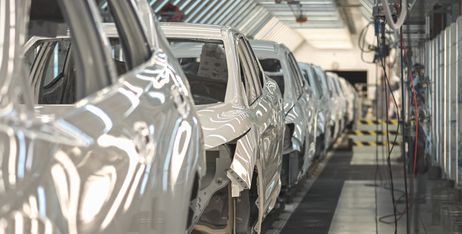New car registrations in the UK totaled 112,162 units in July, down 9% year on year, with supply chain shortages continuing to limit order fulfilment, according to data released Aug. 4 by the Society of Motor Manufacturers and Traders.
“Ongoing global supply chain issues, predominantly the lack of semiconductors, continued to frustrate order fulfilment, exacerbated by COVID lockdowns in key manufacturing and logistics centers in China, plus disruption from the war in Ukraine, all of which restricted production output and thus supply into the UK new car market,” it said.
Due to these factors, the SMMT revised down its industry outlook, forecasting a 2.8% drop in total new vehicles registrations in full-year 2022.
“The automotive sector has had another tough month and is drawing on its fundamental resilience during a third consecutive challenging year as the squeeze on supply bedevils deliveries,” SMMT CEO Mike Hawes said.
“While order books are strong, we need a healthy market to ensure the sector delivers the carbon savings government ambitions demand,” he said, adding that the next prime minister should create conditions for economic growth, restore consumer confidence and support the transition to zero emission mobility.
The UK government plans to ban the sale of new gasoline and diesel cars by 2030.
BEV sales up 9.9%
Battery electric vehicles sales for the month were 12,243 units, up 9.9% year on year, but down 46.2% from June to a five-month low, the data showed.
The BEV market share was 10.9% in July, up from 9% a year ago, but down from June’s 16.1% share.
So far in 2022, 127,965 BEVs have been sold in the UK, up 49.9% year on year and making up 13.9% of total sales, up from 11.9% in January-July 2021.
“Although this is the weakest monthly uplift recorded by BEVs since the pandemic, overall growth in the year has reached 49.9% to deliver a 13.9% market share, illustrating the volatility in the supply chain,” the SMMT said.
Higher EV demand has boosted battery raw material prices. The Platts seaborne lithium carbonate and lithium hydroxide assessments have surged 113% and 136.6% respectively since the start of 2022 to $72,000/mt CIF North Asia and $75,000/mt CIF North Asia as of Aug. 4, according to S&P Global Commodity Insights data.
Sales of plug-in hybrid EVs fell 34% year on year and dropped 15.3% on the month to 6,533 units, which was 5.8% of the total market share, down from 8% a year ago.
The market share of hybrid EVs also fell 6.7% year on year to 13,730 units, which was also down 8.3% month on month and at a market share of 12.2%, up from 11.9% a year ago.
ICE vehicles at 51.3% share
Meanwhile, the market share of petrol and diesel internal combustion engine vehicles moved back above 50% at a combined 51.3% share, up from 49.7% in June, but down from 51.9% a year ago.
Petrol cars continued to hold the largest market share at 45.7% or 51,294 units, which was up from a 44.8% share in July 2021.
The volume of petrol vehicle sales dropped 7.2% on the year in July and fell 36.1% from June, according to the SMMT.
At 6,210 units, diesel vehicles’ market share was 5.5%, down from 7.1% a year ago and a 5.7% share in June.
The diesel volume was down 29.3% year on year and fell 22.4% month on month.
— Jacqueline Holman






